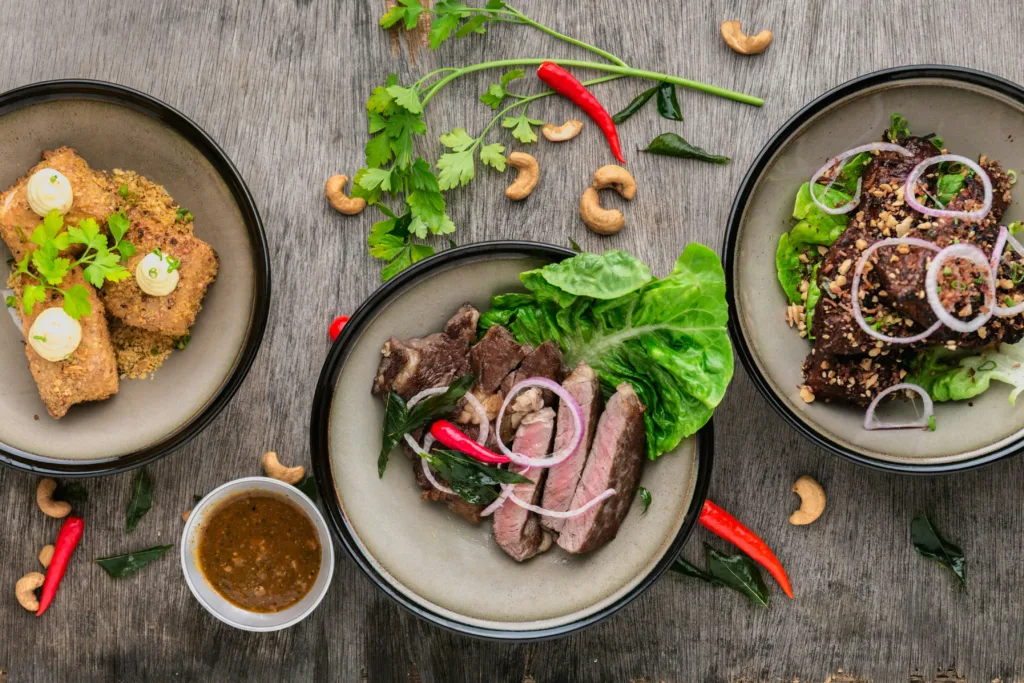Nutrition & Healthy Eating
Winter Workout Fuel: Eating Right in Cold Conditions

Working out during the winter months is not an easy task. The thought of stepping out into the cold, windy weather and working up a sweat can be off-putting.
However, with the right nutrition, you can ensure that your body stays energized and performs at its best, even in the coldest conditions.
As with any workout, the key is to eat right. But when it comes to winter workouts, your body’s nutritional needs change.
The colder weather makes it harder for your body to maintain its temperature and can cause you to burn more calories, so it’s important to fuel your body with the right nutrients to keep it functioning optimally.
In this section, we will discuss the importance of eating right during winter workouts and provide you with valuable nutrition tips specifically tailored for cold-weather exercise.
Key Takeaways
- Eating right is crucial for winter workouts.
- Cold weather can make it harder for your body to maintain its temperature.
- Proper nutrition can help you stay energized and perform at your best in cold conditions.
- Nutrition needs during winter workouts differ from those during other seasons.
- The right balance of carbohydrates, proteins, and fats is crucial for pre-workout fueling in the cold.
Table of Contents
Nutrition Tips for Winter Workouts
Winter workouts can be challenging, but with the right nutrition tips, you can keep your body fueled and ready to perform at its best, even in the cold. Here are some essential nutrition tips to help you stay energized and healthy during your winter workouts:
1. Eat Enough Calories
Winter workouts can burn more calories and keep your body warm. Make sure you eat enough to meet your body’s energy needs.
2. Consume Complex Carbohydrates
Carbohydrates are your body’s primary source of energy, and consuming complex carbohydrates will keep you feeling full and energized longer. Good options include whole-grain bread, oatmeal, brown rice, and quinoa.
3. Don’t Forget About Protein
Protein is essential for muscle repair and growth. Make sure you’re consuming enough lean protein sources like chicken, fish, tofu, and beans.
4. Hydrate Properly
Staying hydrated is critical, even in the cold. Drink water before, during, and after your workout, and consider hydrating with low-sugar sports drinks that replenish lost electrolytes.
5. Warm Up with Hot Beverages
Hot tea, coffee, or cocoa can be a great way to warm up before a workout and provide extra fuel for your body. Just be mindful of the added sugar and calories in some varieties.
By following these nutrition tips, you can ensure that you’re properly fueling your body for winter workouts. Remember to listen to your body’s needs and make adjustments as necessary, and you’ll be ready to tackle any cold-weather workout with ease!
Pre-Workout Fuel for Cold Weather Exercise

When it comes to working out in cold weather, pre-workout fueling is critical. Eating the right balance of carbohydrates, proteins, and fats before your winter workouts can help you maximize your energy levels and combat the cold.
Carbohydrates are essential for pre-workout fuel and are necessary for maintaining high energy levels during your workout. They should be consumed approximately 30 minutes before your workout for maximum effectiveness. Good sources of carbohydrates include oatmeal, whole-grain bread, and bananas.
Proteins are also important for pre-workout fuel, as they help to build and repair muscle tissue. Consuming protein before your workout can also help reduce muscle soreness and fatigue. Good sources of protein include egg whites, Greek yogurt, and lean meats.
Fats should also be included in your pre-workout meal, as they provide a longer-lasting energy source. However, it is important to choose healthy fats such as avocados, nuts, and olive oil. Avoid consuming foods high in saturated and trans fats before your workout.
Here is an example of a pre-workout meal for cold-weather exercise:
| Meal Component | Food Option |
|---|---|
| Carbohydrates | 1/2 cup of oatmeal with sliced banana |
| Protein | 2 eggs scrambled with spinach |
| Fat | 1 tablespoon of almond butter on whole-grain toast |
Remember, each person’s nutritional needs are unique. Experiment with different pre-workout meals to find what works best for your body.
By fueling your body properly before your winter workouts, you can ensure you perform at your best and stay warm in the cold weather. Don’t underestimate the importance of pre-workout fueling; it can make all the difference in your performance!
Hydration and Cold Weather Workouts
Hydration is essential for optimal performance during any workout, and this is especially true for cold-weather workouts. When you exercise in cold conditions, your body loses moisture through sweat and respiration, and it’s essential to replace these fluids and stay hydrated.
Dehydration can impair your physical and mental performance, increase your risk of injury, and make it more challenging to regulate your body temperature in cold conditions. Therefore, it’s crucial to focus on staying hydrated during your winter workouts.
The Importance of Hydration
Drinking enough water and fluids keeps your body functioning correctly, from regulating body temperature to lubricating your joints to supporting your muscles’ function. When you sweat or exhale, you lose water, so it’s essential to drink enough water to replenish these fluids and avoid dehydration.
Dehydration can lead to symptoms such as fatigue, dizziness, muscle cramps, headaches, and a decrease in mental and physical performance. It can also increase your risk of hypothermia and frostbite in cold weather workouts, making it crucial to stay hydrated during these sessions.
Tips for Staying Hydrated
Here are some tips to help you stay hydrated during your winter workouts:
- Drink water before, during, and after your workout. It’s crucial to start your workout well-hydrated and continue to drink water throughout your session to replace lost fluids.
- Choose warm beverages, such as tea or warm water with lemon, to stay hydrated and warm during your workout.
- Bring a refillable water bottle or hydration pack to your workout to ensure you have access to water throughout your session.
- Consume foods with high water content, such as fruits and vegetables, to help supplement your fluid intake.
Final Thoughts
Staying hydrated is essential for maintaining optimal performance during your winter workouts. Remember to drink enough water before, during, and after your sessions, and choose warm beverages to stay hydrated and warm. By following these tips, you can ensure that you stay hydrated and energized throughout your cold-weather workouts, minimizing the risk of dehydration and injury.
Nutrition Tips for Post-Workout Recovery During Winter Exercise

After a challenging winter workout, it’s essential to focus on post-workout nutrition and recovery to help your body repair and prepare for your next session. Here are some valuable nutrition tips to aid in your post-workout recovery during winter exercise:
1. Refuel with Protein
Protein is essential for repairing and rebuilding muscles after exercise. Incorporate protein-rich foods such as lean meats, eggs, and nuts into your post-workout meals. Aim for 20–30 grams of protein within 30 minutes of finishing your workout to maximize muscle recovery.
2. Replenish Carbohydrates
Carbohydrates are your body’s primary source of fuel during exercise. To replenish your energy stores post-workout, consume complex carbohydrates such as whole grains, sweet potatoes, and fruit. Pairing carbohydrates with protein can also enhance muscle recovery.
3. Stay Hydrated
Dehydration can impair muscle recovery, so it’s crucial to stay hydrated during and after winter workouts. Drink plenty of water throughout the day and consume fluids that contain electrolytes, such as coconut water or a sports drink, to help replenish lost nutrients.
4. Don’t Forget About Healthy Fats
Healthy fats can help reduce inflammation and promote muscle recovery. Incorporate foods such as avocados, nuts, and fatty fish into your post-workout meals to reap the benefits of healthy fats.
5. Timing Is Key
Timing is crucial when it comes to post-workout nutrition. Aim to consume your post-workout meal within 30 minutes to an hour after finishing your workout to optimize muscle recovery. If you’re unable to eat a full meal, try a protein shake or a snack that contains carbohydrates and protein.
By following these post-workout nutrition tips during winter exercise, you can help your body recover, reduce muscle soreness, and perform at your best during your next workout. Remember to listen to your body and adjust your nutrition as needed to support your winter workout routine.
Conclusion
Congrats on reaching the end of this article! By following the nutrition tips we’ve provided for winter workouts, you’ll be well on your way to staying energized and performing at your best in cold conditions. Remember to always listen to your body and adjust as necessary to maintain optimal performance throughout the winter season.
Stay Fueled
With the right balance of carbohydrates, proteins, and fats before and after your winter workouts, you can ensure that your body has the necessary fuel to maintain energy levels and properly recover. Consider incorporating some of the foods we recommended to maximize your performance and help you stay warm during cold-weather exercise.
Stay Active
Don’t let the cold weather discourage you from staying active during the winter. By dressing appropriately and staying hydrated, you can continue to enjoy your favorite outdoor activities even in sub-zero temperatures.
Enjoy Your Winter Workouts
Winter workouts can be a fun and rewarding way to stay active and healthy. Whether you’re skiing down a mountain, ice skating on a frozen pond, or simply taking a brisk walk in the snow, make sure you’re properly fueling your body to make the most out of your winter exercise routine.
FAQ
What are the best foods to eat for winter workouts?
The best foods to eat for winter workouts are those that provide a good balance of carbohydrates, proteins, and fats. Aim for a mix of whole grains, lean proteins, fruits, and vegetables to fuel your body and keep you warm during cold conditions.
How much should I hydrate during winter workouts?
It’s important to stay hydrated, even in cold weather. Aim to drink 8 to 10 cups of water per day, and increase your intake during winter workouts. Listen to your body’s thirst cues and drink enough fluids to stay properly hydrated.
What should I eat before a winter workout?
Before a winter workout, it’s important to consume a balanced meal that includes carbohydrates, proteins, and fats. Some good options include oatmeal with nuts and berries, a banana with peanut butter, or a whole-grain wrap with lean protein and veggies.
How soon after a winter workout should I eat?
It’s recommended to consume a post-workout meal or snack within 30 minutes to an hour after your winter workout. This will help replenish your energy stores and aid in muscle recovery. Opt for a combination of carbohydrates and protein for optimal results.



